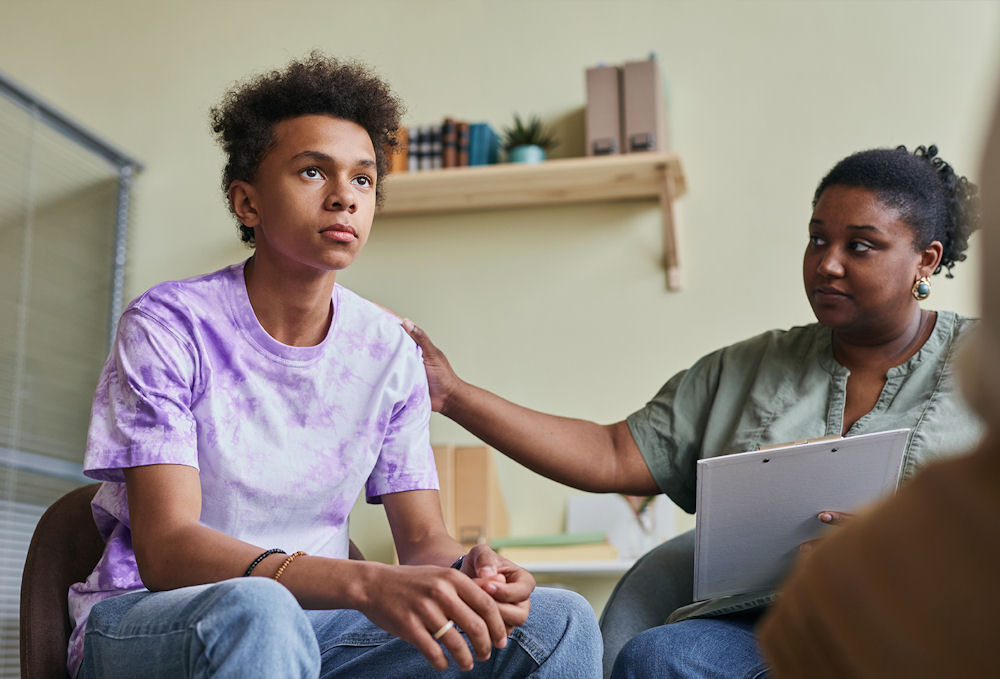Adolescent Mental Health Treatment Center in Maryland

Overview of Our Adolescent Mental Health Treatment Program
At Elevated Wellness, we offer outpatient mental health and substance use treatment programs for adolescents ages 13 to 17 years old. Our licensed professionals provide individualized treatment focused on each adolescent’s specific needs. Treatment modalities utilized include individual therapy, group therapy, family therapy, and medication management.
The ultimate goal of our adolescent program is to provide a supportive environment for teens to develop insight into their mental health conditions, learn strategies and skills to effectively manage symptoms, build resilience, and work towards leading a healthy, productive life. Our dedicated treatment team is passionate about helping adolescents thrive and reach their full potential.
What Mental Illnesses Do Our Programs Treat?
We specialize in treating adolescent depression, which involves persistent feelings of sadness and hopelessness. Additionally, our programs address other mood disorders like dysthymia (persistent depressive disorder) and cyclothymia (fluctuating mood patterns).
Our team is equipped to help individuals dealing with various anxiety disorders, including social anxiety disorder, generalized anxiety disorder, and panic disorder. These conditions involve excessive worry, fear, or apprehension, impacting daily life.
Elevated Wellness is experienced in treating behavioral disorders such as oppositional defiant disorder (ODD) and conduct disorder (CD). These disorders are characterized by persistent patterns of challenging behavior, defiance, and disobedience, affecting relationships and daily functioning.
Our programs also address post-traumatic stress disorder, commonly known as PTSD. This condition can occur after experiencing or witnessing a traumatic event, leading to symptoms such as flashbacks, nightmares, and severe anxiety. Our team is trained to provide effective interventions for individuals struggling with the aftermath of trauma.
Our adolescent mental health treatment center offers support for individuals dealing with substance use disorder, addressing issues related to the misuse of substances, including alcohol and drugs. Our programs focus on comprehensive treatment and recovery.
We provide specialized treatment for eating disorders, encompassing conditions such as anorexia nervosa, bulimia nervosa, and binge-eating disorder. Our team works towards promoting a healthy relationship with food and body image.
Our programs include interventions for ADHD, a neurodevelopmental disorder characterized by challenges with attention, hyperactivity, and impulsivity. We aim to help individuals manage symptoms and improve their daily functioning.
Elevated Wellness addresses relationship disorders, focusing on interpersonal challenges and conflicts. Our programs provide therapeutic support to enhance communication, understanding, and overall relationship well-being.
Bullying can have severe consequences for the mental health of those targeted, leading to anxiety, depression, and low self-esteem. It can affect both the victim and the perpetrator. We offer counseling and therapeutic interventions to help victims cope with the emotional toll of bullying.
Transitioning to college involves challenges like academic demands, social changes, and newfound independence. Our team supports you in learning crucial coping mechanisms for stress management, including time management, seeking support, building resilience, and honing effective problem-solving skills.
By offering targeted treatments for this diverse range of mental health challenges, we strive to support individuals in their journey toward improved well-being and mental wellness.

Evidence-Based Therapies Used in Our Treatments
Cognitive-Behavioral Therapy (CBT) teaches adolescents to identify and change destructive thought and behavior patterns. CBT helps adolescents address the symptoms of conditions like anxiety, depression, trauma, and substance use disorders.
Dialectical Behavior Therapy (DBT) focuses on mindfulness, distress tolerance, emotion regulation, and interpersonal effectiveness. DBT provides adolescents with skills to better manage emotional reactions, reduce conflict, and improve relationships. DBT is particularly helpful for those struggling with borderline personality disorder, bipolar disorder, and other impulse control issues.
Trauma-Focused Cognitive Behavioral Therapy (TF-CBT) helps adolescents process and overcome traumatic experiences. TF-CBT teaches coping strategies to manage distressing trauma-related thoughts and memories. It helps build resilience and improves functioning for those with post-traumatic stress disorder (PTSD) and other trauma-related conditions.
Motivational Interviewing (MI) is a collaborative approach used to strengthen adolescents’ motivation for change. MI helps explore ambivalence toward treatment and builds confidence in the ability to change destructive behaviors like substance abuse. MI is effective for conditions like addiction, eating disorders, anxiety, and depression.
Building Resilience and Independence through Therapy and Life Skills
Adolescents in the program will attend daily therapeutic and educational groups focused on developing skills to cope with life challenges healthily. Led by licensed therapists and groups such as dialectical behavior therapy (DBT) and cognitive behavioral therapy (CBT), adolescents will learn how to identify and modify thought patterns that contribute to distressing emotions and maladaptive behaviors.
Adolescents will learn skills to properly manage symptoms of anxiety, depression, trauma, and other mental health conditions. We will develop personalized wellness plans to maintain good sleep hygiene, nutrition, exercise, and stress management. Our program also provides education on safe medication management and substance use avoidance.
Our program focuses on strengthening interpersonal skills through social skills training and family therapy. Adolescents will learn assertive communication, conflict resolution, and how to establish healthy boundaries. Sessions on relationship building, dating, and sexuality education will guide adolescents to develop meaningful connections with others responsibly.
As adolescents approach the end of our program, the focus shifts to preparing for increased independence and transitioning back to home, school, and community environments. Life skills such as time management. problem-solving and decision-making are reinforced. Discharge planning involves linking adolescents to community resources and supports to help them continue utilizing the skills and tools they have gained to maintain wellness
Through comprehensive therapeutic interventions and life skills education, the adolescent program at Elevated Wellness Clinic aims to equip adolescents with the ability to cope with challenges in a healthy way and successfully transition to independent functioning. Ongoing family support and aftercare help ensure continued progress and success.
Who Benefits From Adolescent Mental Health Treatment Centers?
In addition to benefiting adolescents directly, the involvement of teens in mental health treatment centers positively impacts their families. As teens learn and apply new coping strategies, communication skills, and emotional regulation techniques, they can share these insights with their family members, fostering a more supportive and understanding home environment.
Moreover, the broader community stands to gain from the positive outcomes of adolescent mental health treatment. As teens at Elevated Wellness become advocates for mental health awareness, they contribute to reducing the stigma surrounding mental health issues. This, in turn, helps create a more compassionate and informed society that is supportive of individuals facing mental health challenges.
In summary, adolescent mental health treatment centers in Maryland provide a comprehensive approach to supporting teens, their families, and the community at large. The inclusion of teens in their mental health journey not only benefits their well-being but also contributes to the creation of a more empathetic and educated society.

